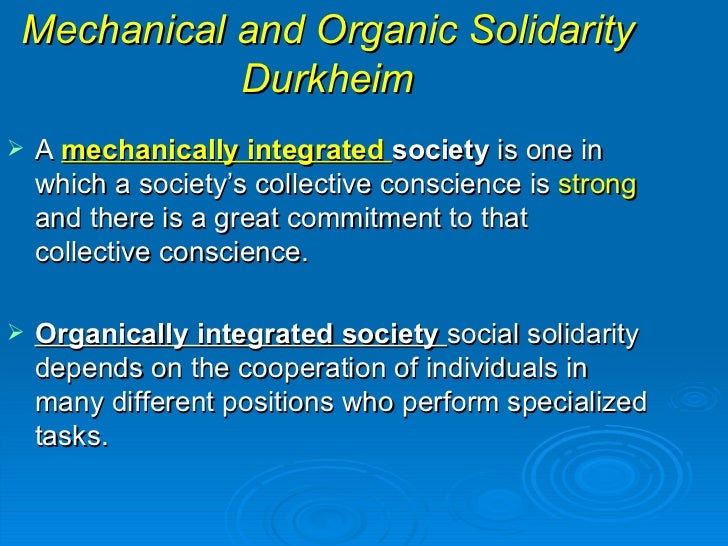Imagine a bustling marketplace, filled with vendors selling their wares, the air humming with the chatter of bartering and the scent of spices. Each stall operates independently, yet they are drawn together by a shared purpose – to trade and thrive. This, in essence, is a microcosm of mechanical solidarity – a powerful societal force that binds individuals together through shared beliefs, traditions, and practices, creating a cohesive and harmonious society.

Image: sociology.plus
This article delves into the fascinating world of mechanical solidarity, exploring its foundations, exploring its significance in shaping human societies, and understanding its relevance in our increasingly complex and interconnected world. You’ll discover how this concept, rooted in the work of renowned sociologist Émile Durkheim, continues to resonate with modern-day societies, offering valuable insights into our collective existence and the forces that bind us together.
The Foundations of Mechanical Solidarity: A Shared Belief System
At the heart of mechanical solidarity lies a common set of beliefs, values, and norms that bind individuals together in a collective identity. Think of it as the glue that holds a community together, a shared sense of purpose and belonging that fosters cooperation and unity. This sense of shared identity often arises from shared experiences, traditions, and cultural practices, forging strong bonds of kinship and loyalty.
In societies characterized by mechanical solidarity, individuals tend to share similar values and engage in similar activities. The collective consciousness, a term coined by Durkheim, permeates every aspect of life, guiding individuals’ actions and shaping their sense of belonging. Here, individual uniqueness is often subjugated to the needs of the group, emphasizing conformity and adherence to shared norms.
A World of Shared Values: Examples of Mechanical Solidarity
Examples of mechanical solidarity can be found throughout history and across cultures. In traditional tribal societies, for instance, strong kinship ties, shared rituals, and a common belief system contributed to a sense of belonging and a strong sense of community. Similar examples can be observed in small, isolated villages where close-knit relationships, shared economic activities, and a collective responsibility for community well-being contribute to a deep sense of solidarity.
The Role of Religion in Mechanical Solidarity
Religion often plays a key role in fostering mechanical solidarity. Shared beliefs, rituals, and sacred texts create a powerful sense of belonging, reinforcing the shared values and norms that shape a community’s identity. Religious institutions can serve as crucial social hubs, fostering social cohesion and providing a framework for collective action.

Image: www.slideshare.net
The Changing Landscape: From Mechanical to Organic Solidarity
With the rise of industrialization and urbanization, the nature of societies began to shift, leading to a transition from mechanical to organic solidarity. In organic societies, individuals are bound together by complex interdependence and specialization, fueled by a complex web of shared needs and contributions. This complex division of labor, inherent in modern industrial societies, necessitates cooperation and mutual dependence, fostering a different type of social order.
Understanding the Shift: The Legacy of Durkheim’s Insight
Emile Durkheim’s seminal work on mechanical and organic solidarity offered a framework for understanding the evolving dynamics of societies. His insights resonated throughout the field of sociology, providing a valuable lens through which to analyze social change and the forces that govern human relationships.
Modern Societies and the Complexities of Mechanical Solidarity
While modern societies are predominantly characterized by organic solidarity, the concept of mechanical solidarity remains relevant. In an increasingly diverse and fragmented world, pockets of mechanical solidarity continue to thrive, offering a sense of belonging and purpose. From faith-based communities to tightly-knit social groups, there’s evidence that shared values and beliefs can still bring individuals together, fostering a strong sense of community and shared identity.
The Implications for Modern Life: Leveraging Solidarity for a Better World
Understanding mechanical solidarity can provide valuable insights for navigating the complexities of modern life. It reminds us that while we may be drawn together by our differences, a shared sense of purpose and shared values can serve as a powerful force for unity and positive social change.
Finding Common Ground: Tips for Fostering Mechanical Solidarity
Here are some practical tips for fostering mechanical solidarity in your own life:
- Connect with your community: Engage with your neighbors, participate in local events, and contribute to your community.
- Find common ground: Seek out common interests, values, and experiences with others.
- Build bridges: Reach out to individuals from different backgrounds and cultures, fostering understanding and appreciation.
- Embrace shared traditions: Participate in cultural events, traditions, and holidays that celebrate shared values and heritage.
Mechanical Solidarity Is
Conclusion: The Enduring Power of Shared Values
In a world often defined by division and fragmentation, mechanical solidarity serves as a potent reminder of the power of shared values, beliefs, and traditions. As we continue to evolve as a society, understanding this concept can guide us towards building stronger communities, fostering social cohesion, and working towards a more harmonious future.






